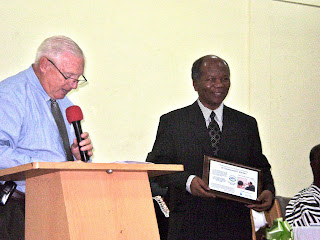It has been a long time since we posted on our blog. This is because we returned home to Utah in August, after a life-changing experience of 7 months in Ghana. We thought we had pretty much accomplished what we were sent to do. John returned to Utah State University to begin another semester. Ann quickly readjusted to being home and spoiling grandchildren. But, in the words of Paul Harvey, "here is the rest of the story."
To understand what happened next, we have to go back in time. While we were in Ghana John attended a conference in Anaheim, California where he met Anita Chambers and Patricio De Silva, who were from Odulair, the company that built 8 mobile medical vans for Ghana. A team of trainers came to Ghana in May to train the operators of the vans, however, the local doctors were on strike. After three weeks of waiting, the Odulair team had to return home, having trained no one in Ghana. The vans remained in a secured parking lot with no one to operate them.

We now move the clock forward to November, 2013. This was the month that the first students in audiology in Ghana were supposed to graduate. The problem was, no date was had been set for the ceremony. John wanted somehow to return to Ghana with some equipment he had obtained from a generous grant from the Demant/Oticon Foundation in Denmark and from other sources. He did not know how he was going to do this and be present for the graduation. John wanted to surprise the students. One day he was contacted by Anita, President of Odulair. She had been invited back to Ghana by the Minister of Health to provide the necessary training for the vans. The original trainers for could not come, so she extended an invitation to John to come as the audiology trainer. The problem was that the date had not been set for the actual training. With one day's notice, once a date was firmed up, John rearranged his teaching schedule at the university, bought a ticket, packed his bags to the brim with medical equipment for Ghana and headed to the airport. He met up with Anita and Patricio in Frankfurt, Germany, then flew to Accra.
 The team was to be in Ghana for a week. John spent time getting acquainted with the equipment, then spent two days training the students he had taught earlier in the year, as well as hospital staff. The next day the Odulair team and all those who had been trained went to what is now known as the most toxic place on earth, affectionately called Sodom and Gomorrah by the Ghanaians. It is a toxic dump that is home to over 4000 people (men, women and children) who have immigrated from the north of Ghana. They live in squalor. We will spare you the details, needless to say, the people in this neighborhood up to this time had not had access to healthcare.
The team was to be in Ghana for a week. John spent time getting acquainted with the equipment, then spent two days training the students he had taught earlier in the year, as well as hospital staff. The next day the Odulair team and all those who had been trained went to what is now known as the most toxic place on earth, affectionately called Sodom and Gomorrah by the Ghanaians. It is a toxic dump that is home to over 4000 people (men, women and children) who have immigrated from the north of Ghana. They live in squalor. We will spare you the details, needless to say, the people in this neighborhood up to this time had not had access to healthcare.
On the day of the event all 8 vans (F-550 Ford trucks) with medical equipment and self-contained 20 kilowatt generators were parked in a circle in the middle of the dump. Tents were erected. One tent was for free medications that were distributed throughout the day to needy patients. There was an opening ceremony where several dignitaries spoke to the local residents. After the festivities, all the vans became active clinics, seeing hundreds of patients. The day was exhausting, but extremely successful.
The following day, John went to the University of Ghana School of Health Sciences and presented audiological equipment for the students to use. He then spent time training students and faculty on how to use the equipment.
One of the 8 vans that will be used throughout Ghana to provide initial medical service to remote areas and to people who cannot access healthcare. There were 2 ENT/Audiology, 2 General Medecine, 2 Dentistry and 2 Ophthalmology vans.
Awkward pose while John demonstrates new equipment to faculty and students at the University of Ghana.
John demonstrating equipment in one of the vans.
Patients attending ceremonies, waiting to be seen.
It was good to see so many of our Ghanaian friends. John was also able to link up with some Ghanaian saints and senior missionaries during his stay.
There is still work to do, but there is also hope that a new day is dawning in Ghana and that with an indomitable will and determination, audiological services will be available to more and more West Africans. Who knows what lies ahead?
Post script: Note from Anita after John returned home.
"You would be very proud of your students at the clinic. On one day when we were seeing school children they did 478 hearing tests in 6 hours, and yes they even did a hearing test on me."














































